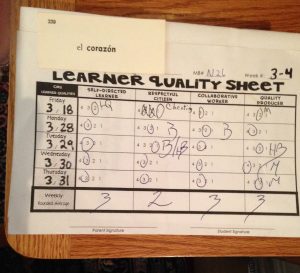The illustration above is part of a behavior-modification plan for a seventh grader.
I borrowed this Dear Abby letter from http://lubbockonline.com/filed-online/2016-07-03/dear-abby-friends-admit-living-it-isnt-all-its-cracked-be#.V3psI6x_xxI. The Lubbock Avalanche-Journal makes a good first impression.
Dear Abby: My wife and I have a good marriage and two well-behaved kids who are good students and active in our community. Our 8-year-old son is very much the rule follower in school and outside activities, but cheats when playing board or card games with me or his sister at home.
When I catch him doing it, I end the game and tell him I won’t play with him if he’s going to cheat. My wife believes the cheating is “just for fun” and that I’m being too hard on him. I say the lesson I’m teaching him is that cheating is wrong.
We agree we are fortunate this happens only at home, but I’m concerned that if it is left unchecked, it will be regarded as permissible and it will escalate to become a problem in other circumstances. What do you think? Should I let up? — Virginia Dad
Dear Dad: No, stick to your guns. And the next time you catch your son cheating, impress upon him that if others catch him at it, they not only won’t want to play games with him, but also may not want to be friends with him.
Eduhonesty: Abby’s answer may be alright as far as it goes, but I’d say she does not go far enough. How does dad know this boy is not cheating in school? Cheating has become endemic in American education. The news is peppered with reports of district and school administrators cheating right now, let alone students. Still, dad may be right. Cheating may only be a problem at home — so far.
Dad is coming up on a problem that he may not realize will be part of the bigger cheating picture for his boy, however, a problem that Abby missed. Right now, his boy appears to be on track. Early elementary school students make teaching so easy in some ways.
“Ms. Q, Robbie is sitting in Mayra’s spot!”
“Ms. Q, Mayra is touching the stapler! That’s against the rules!”
“Ms. Q, Robbie looked is looking in the book! You said not to!”
But somewhere in the middle of elementary school, those innocent reports about Robbie’s and Mayra’s misbehavior fade away, as social codes shift. Kindergartners are natural snitches, but over time they learn better. They come to appreciate how much easier their social life becomes when they keep silent.
Snitching can be social suicide and any socially adept eight year old will figure that out. Even kids who dislike the idea of cheating often cease to speak up. The cost outweighs the benefit, with risks as large as getting ostracized or beat up on the playground. While the no-snitching code may be stronger in some cultures than others, that code has become regrettably standard today.
This boy is eight-years old. The transition occurs around eight years of age, give or take a year of two. Yes, kids may not play with this boy if he cheats at games, but cheating at his schoolwork won’t necessarily be a huge social black mark against him. He may even influence others to cheat as they see the short-term effect on his grades, and in the event his son gets caught cheating, not much is likely to happen. We lecture, we explain, and we sometimes even send students to the Principal’s office. Certain kids find these scoldings so intimidating that they think twice before cheating in the future. But other kids slough off our words. Teacher’s and administrator’s recriminations slip off them like water off the proverbial duck’s back.
Dad in the above letter needs to be hammering home the anti-cheating topic and I would say that eight is not too young to spend time on the long-term consequences of cheating. I’d start with, “O.K., you cheated and you won. How do you feel about that win? Were you really the best player? Would anybody who found out you had to cheat to win think you were the best player? Do you think people will respect you if they believe you have to cheat to win? Will you respect yourself?”

